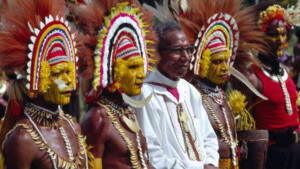
WelCom, September 2024
When Pope Francis visits Papua New Guinea in September, Fr Mario Abzalón Alvarado Tovar, the Superior General of the Missionaries of the Sacred Heart, says the Holy Father will find a Church with a strong practice of faith, but in the style of Papua New Guinea. These are very ancient peoples with very ancient traditions. For them, the Pope’s presence is a confirmation of their journey as a Church, as the people of God.
Speaking to Vatican News in July, the Guatemalan-born missionary describes Papua New Guinea as a multicultural world and the Church there as multi-coloured, multilingual, and multiethnic in every sense.
‘There is a saying that describes Papua New Guinea,’ Fr Alvarado said, ‘as “the land of the unexpected”.’
It is a country with a very ancient cultural tradition but with a way of life very different from the Western world.
‘Pope Francis will find a Church with a strong practice of faith, but in the style of Papua New Guinea, of the islands of New Guinea, of the mainland, of the highlands, and of the coastal areas,’ he said. ‘These are very ancient peoples with very ancient traditions. We need to change the SIM card in our heads when we arrive in Papua New Guinea.’
Referring to the ecclesial reality Pope Francis will encounter in Papua New Guinea, Fr Alvarado indicated that it is a Church with many rituals and dances, born from a rural world of jungle, rivers, fishing, and hunting.
Fr Alvarado emphasised there has been significant progress in Papua New Guinea, and there is a strong Church on the island. However, it faces challenges like those worldwide, such as climate change, mining with no respect for local communities, and systemic poverty.
‘There is systemic poverty in Papua New Guinea, despite being a country with incredibly large natural resources. Many international companies are exploiting the country. Climate change is felt strongly, as it is a country heavily dependent on its natural resources. Deforestation and large-scale monocultures affect the people. Mining ‘without a human face’ is also a major issue. The Church is deeply affected and strives to stand with the most needy. Additionally, the tribal world is a challenge for foreigners and the Church alike – how to respect tribal or clan structures and evangelise from within, while respecting and trying to heal the anti-values that exist within all social and ecclesial structures. It’s a significant challenge because these are very different worldviews.’
Source: Vatican News